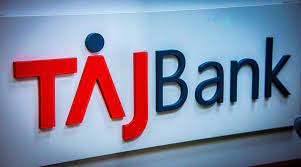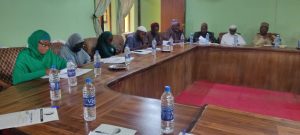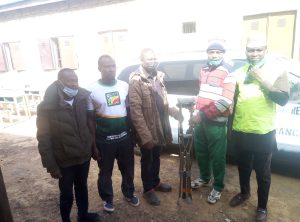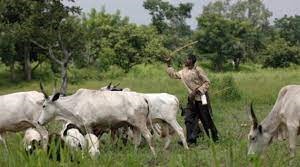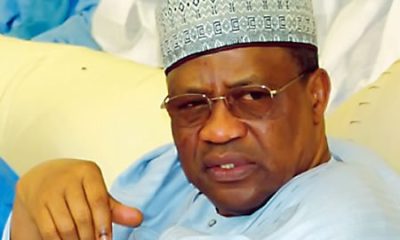NEWS
Islamic Cleric, others Condemn Open Grazing
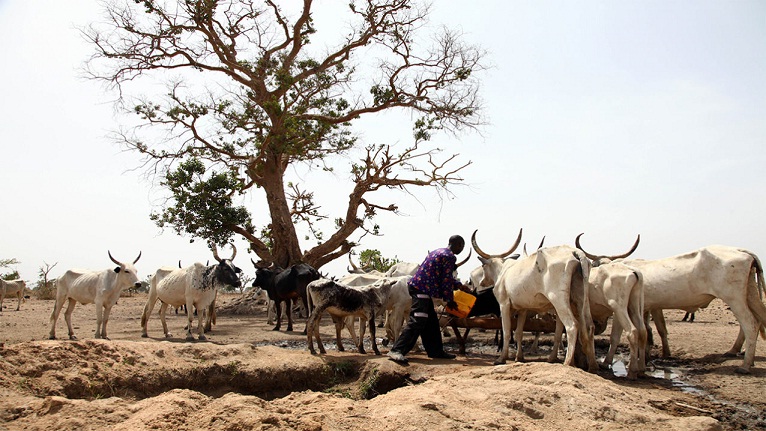
The founder of Islamic Research Centre (IRC), Sheikh Mohammad Nuru Khalid, has condemned open grazing and described it as nomadic system, saying we cannot continue since is it no longer fashionable.
he Islamic cleric spoke as pne of the participants at the zoom town hall meeting organized by the National Association of Seadogsv (Pyrates Confraternity) Abuja 1 Chapter, to commemorate the 2021 International Day of Peace.
The theme of the meeting was “Fostering Peace in a Climate of Mutual Distrust, the Role of Leadership”.
The town hall meeting which was moderated by Mr. Viktor Oscar Ikiriko, a Peace Ambassador and public commentator, also had in attendance Mrs Kemi Okenyodo, a legal practitioner and Executive Director, Rule of Law and Accountability Centre and founder of 1001 voices, Chief Ide Owodiong Idemeko.
Sheik Khalid argued that peace was possible in Nigeria, but “we first need to create psychological peace in the people. It is only when one has peace of mind that he or she can give peace to others.”
He further said that some politicians and international persons seemed to be benefitting from the alleged inability of the government to stem the tide of insecurity.
“Boko Haram insurgency was used as an excuse to vote out the Good luck Jonathan administration but the current administration has failed badly in addressing issues around insecurity in the country”, he said.
Speaking on electoral violence, Sheikh Khalid advocated for stringent laws against political thuggery, while stressing that making laws by itself will solve no problems unless the laws were fully and impartially enforced.
On choosing leaders in the forthcoming general elections, he warned that merit should not be sacrificed on the altar of religious and ethnic sentiments, adding that sentiment in the choice of leaders was another monster that the nation has to deal with.
He advised that emotions should be kept aside, while Constitutional provisions be followed because “it is what binds us together as a secular state without any religious or ethnic preference.”
Sheik Khalid warned against the current fire brigade approach allegedly adopted in reacting to religious crises and advised that “we adopt the more proactive approach of holding regular interactions with citizens and having Imams and Christian clergymen together preaching peace and religious tolerance.
“Doing this regularly will improve religious harmony and also reduce distrust among Christian and Muslim faithful, this he says will work better than them preaching to their faithful individually in Churches and Mosques.”
He also spoke on the need to empower religious associations like the Christian Association of Nigeria and the Supreme Council of Islamic Affairs to suspend or sanction erring religious leaders who preach hate and violence.
In addition, he advised that to curb the farmer/herders clashes which had contributed to national insecurity, cattle breeders be gradually migrated to modern methods of cattle breeding starting with grazing reserves and stopping the movement of cattle around to graze openly.
“The nomadic system we are using now is no longer fashionable. Security agents should also be empowered to curtail banditry and dispel the belief all Fulani people are bandits,” he said.
In his own submissions, Idemeko posited that to foster peace, ordinary citizens need to be brought into the policy making process and also have increased access to quality education, good healthcare, affordable housing and enhanced food security.
“It is only when citizens are physically empowered before they can contribute meaningfully to social discourse,” he said.
He further said, “when you have good governance and meritocracy in the system, nobody cares where the next President is going to come from”, he said.
In proffering solution, Idemeko advised that the country should take a critical look at the roles and responsibilities of traditional rulers who he said are also stakeholders in project Nigeria and fashion out a fundamental role for them in internal security.
He also advocated for state and local government policing and the strengthening of our institutions to drive our democratic process.
Idemeko pointed out that security is everybody’s business and leaders should engage the youths and give them jobs to do so that they will not be open to banditry and other vices.
Mrs. Okenyodo attributed insecurity in Nigeria to bad governance, adding, “Bad governance causes strife and conflicts and these in turn cause insecurity. Ensuring equal opportunities and implementing judicial reforms will help douse tension in the polity.”
She advised leaders to take the welfare and security of the vulnerable members of the population seriously, “otherwise perpetrators of evil will fill this gap and win their minds as nature abhors a vacuum.
“A system that neglects its citizens stands the risk of the citizen’s revolting against it.”
NEWS
Let’s Fix PDP to Fix Nigeria, Says Makinde

By Johnson Eyiangho, Abuja
The Governor of Oyo State, Seyi Makinde has called on members of the Peoples Democratic Party (PDP) to fix the internal crisis in the party as the PDP is capable of fixing the country.Makinde, who spoke yesterday at the inauguration of the Board of Governors and Unveiling of Roadmap for the Peoples Democratic Institute (PDI), said that as the nation approaches 2027 for another general election, it was clear that the PDP has the capacity to provide direction for Nigerians.
The Oyo State Governor, who was the special guest at the occasion, asked rhetorically, “What would you want to be remembered for? This is a question every politician who has had to serve at any capacity in our great nation should ask themselves. Because players would come and go.”The situation is so dynamic, but you have to be remembered for something.”From 2019, I’ve been benefitting from PDP. So, I want to say thank you to our great party, and all the stakeholders gathered here today, for giving me the opportunity to get not one, but two mandates, back to back, under this umbrella.”The only thing I can promise you is that since I have fetched water from that well I have been drinking since 2019, I will not pollute the well when it is time for me to exit that position.”The journey to this day has not been all smooth, but I’m thankful that we are able to overcome all the obstacles along the way.”On the PDI, Makinde said that with inauguration of the institute Board of Governors, the PDP is moving a step closer to defining the ideology that the party stands for, and cementing what the party as a whole will want to be remembered for.He said, “Let me especially thank all the people that are members of the party that has put aside grievances, and played a role in the re-establishment and revitalisation of the PDI” recalling that the institute was formed during the administration of President Olusegun Obasanjo.”So, one will take a pause and say okay, what happened during the 16 years of PDI in power nationally? “You can see that with the PDI, there is a pivotal rule, and during those years, we can rightly refer to as the golden years, because since we are working through the plan, we got debt forgiveness, we were interacting with everybody around the world, we were not in pariah relations,” he said.He called on members to rally round the party and set aside their differences, saying there was need for true reconciliation and unity to wrestle power from the APC in Ondo State, whose governorship election has been slated for November 16, 2024.In his contribution, former Senate President, Dr. Bukola Saraki, noted that parties are built on ideas, philosophies and policies, stressing the need to move away from building ideas on self and ambition.Sakari said: “We cannot have an ambition if we don’t have a party. We cannot have a party if we don’t have ideas. This is where it starts from. This is the foundation that is important. “Let us desist from talking about who is running for councillor, or who is running for governor, or who is running for president in 2027. Let us talk about what PDP is. What does PDP represent? What are the issues and policies that we must take into account?”This is what is important for us. This is what Nigerians outside want to know. This is what is important.”Earlier the Acting National Chairman of the PDP, Amb Umar Damagum ,who was represented by the party’s National Organising Secretary, Hon. Umar Bature, said there needed to reposition and unite the party to play its opposition role.NEWS
Otu Mourns Lagbaja’s, Describes Late COAS as Courageous Soldier
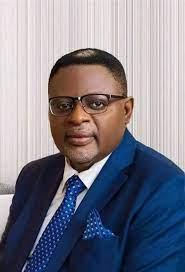
From Ene Asuquo, Calabar
Cross River State Governor, Senator Bassey Edet Otu has expressed profound sadness over the sudden death of Lt. General Taoreed Lagbaja, who, until his passing, was Chief of Staff of the Nigerian Army.Describing the death of Lagbaja as a great loss to the Nigerian Army, the military, and the entire nation, Governor Otu, in a condolence message signed by his Chief Press Secretary, Nsa Gill, said: “The late Chief of Army Staff’s untimely departure is a devastating blow and a monumental loss not only to the military but to our nation as a whole.
”Lamenting the painful death of Lt. General Lagbaja while acknowledging his bravery, Governor Otu noted that “he was known for his unwavering commitment, exemplary leadership, and dedicated service to Nigeria. Throughout his distinguished career, he played a crucial role in safeguarding the country’s sovereignty and enhancing the security of our citizens.”The governor praised the fallen Chief of Army Staff and his strategic vision, saying: “His relentless pursuit of excellence in the face of challenges was inspiring to all who served under him.”As the nation mourns the loss of Lagbaja, Governor Otu urged Nigerians to celebrate the late Chief of Army Staff’s legacy of courage, bravery, and dedication, adding that “Lt. General Lagbaja’s service to Nigeria will forever be remembered, and his contributions will continue to inspire future generations of military personnel.”On behalf of the government and the good people of Cross River State, Governor Otu extended his deepest sympathies to Lagbaja’s family and the Nigerian Army, adding: “May his soul rest in peace, and may we find solace in the memories of his service to our nation.”NEWS
Tinubu Tasks Media to Hold Leaders Accountable
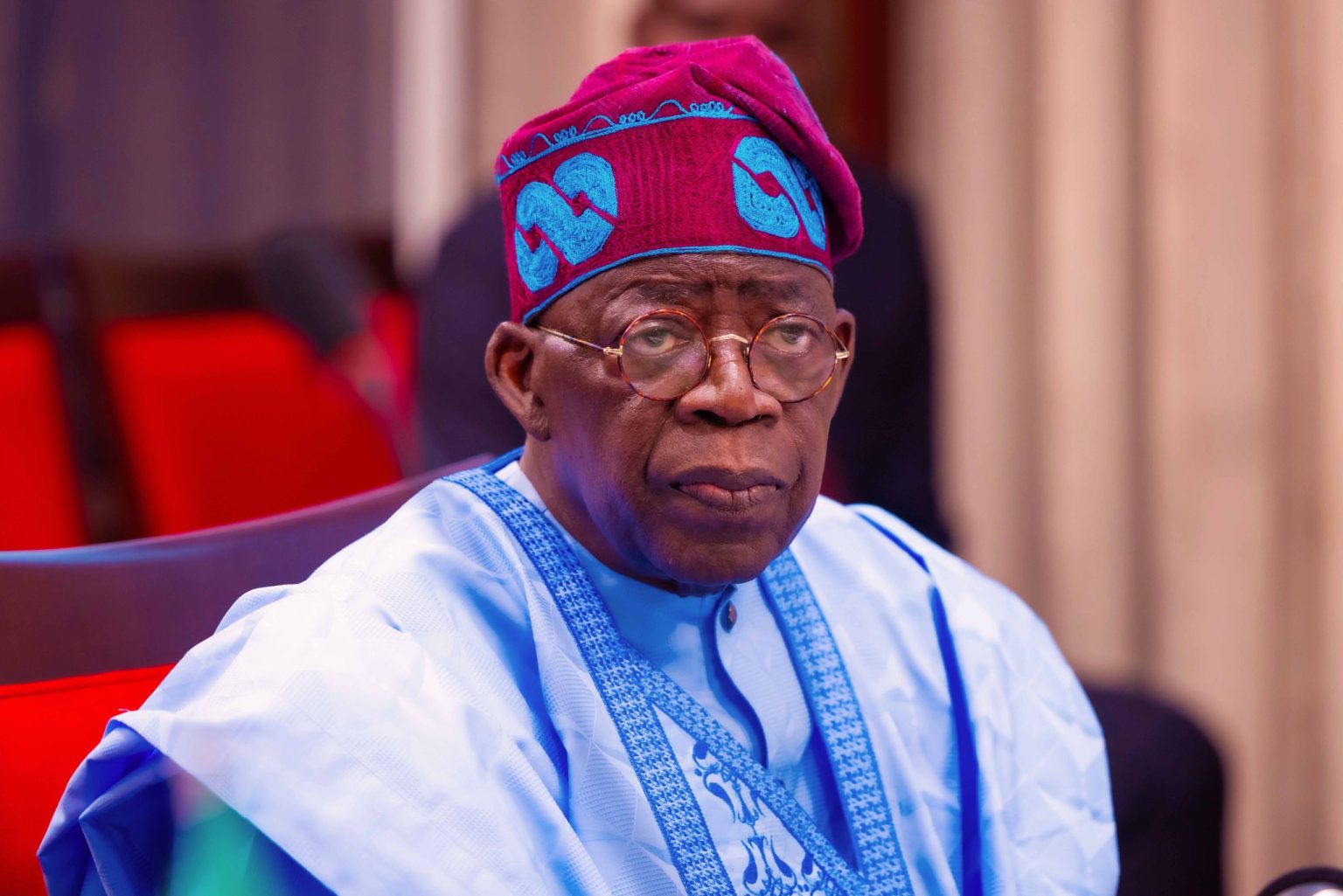
From Mike Tayese, Yenagoa
President Bola Tinubu on Thursday said the Media has a duty to hold the elected and appointed officials accountable and ensure that they do their work in a manner to strengthen democracy and not weaken it.He said in any thriving democracy, the roles of the government and the media are intertwined, both essential in serving the public interest.
Saying the alignment enables us to achieve common goals that benefit society at large. Tinubu who was represented by the Minister of Information and National Orientation Hon. Mohammed Idris handed down this during the 20th All Nigeria Guild of Editors Conference at the Banquet Hall in Yenagoa the state capital.He said in the room are many veteran journalists who played very important roles in ushering in the age of enduring democracy in Nigeria. “I salute your individual and collective efforts not just at that time, but even right through to today, as we celebrate a quarter of a century of unbroken democratic experience”.This year’s theme which was titled:”Economic Growth and Development Strategies in a Resource-Rich Country” had in attendance media moguls across the federation.According to the president, “Indeed, our roles are most effective when they are not adversarial but cooperative.By viewing each other as allies in nation-building, we can create an environment where transparency, accountability, and mutual respect thrive. Together, the government and the media can empower citizens, strengthen democratic institutions, and build a more informed and resilient society”.”As editors and media managers, your role in national development cannot be overemphasized. You are the custodians of public perception, the gatekeepers of information, and, importantly, the voice of the people. You have the power to shape narratives that inspire, inform, and engage Nigerians positively and productively. We count on you to report truthfully and to engage constructively to help the public understand not only what this government is doing but also why we are doing it.With a united effort from government, citizens, and the media alike, we can build a resilient, diversified economy that offers security, opportunity, and hope for all Nigerians”.In his opening speech, the host governor senator Douye Diri said, the significance of the media in democratic governance has been recognised since the 17th century. Speaking as the fourth pillar of democracy, the press educates, informs, and entertains, shaping public agenda and debate. Democracy relies heavily on the press to thrive.According to Diri, as ethnic nationalities and diverse interests vie for attention, “your work serves as a beacon of hope, promoting understanding and unity. In these turbulent times around our nation and the world at large, your role as guardians of truth is more critical than ever”.He said integrity remains the cornerstone of the profession, building trust with the public and fortifying the foundations of a healthy democracy.“Economic Growth and Development Strategies in Resource-Rich Country,” your theme for this conference, is both relevant and timely. Therefore, we implore you as editors and influential voices, to advocate for policies that prioritise sustainable development and empower local communities.In his goodwill message, the former governor also of Ogun state, Chief Olusegun Osoba urged the NGE before they leave to set up a committee to look into the crisis brewing in the NUJ, “they are supposed to hold their annual conference but some people are saying that the president has overstayed his tenure and they took him to court. “You are the only united group after the NPAN to intervene in that crisis brewing in the NUJ”.In his speech, the chairman of conference Chief Nduka Obaigbena said, the time is hard but Nigeria journalists are harder so they have to be tough to cope with the time.He said, Nigeria needs to be fixed first if we want to get it right, saying that it is the first thing to do and work hard to ensure that we also protect our Industries.”Are we going to protect Dangote refinery from cheap imports? If Dangote fails then we all have failed. If we are going to use whatever means to deal with the oil mafias, we should keep our refinery alive. If you say you want to stop monopoly then the four refineries must work””Let that four refineries be completed with Dangote so that they can compete. We challenge the Minister of information to get the refineries working. Everybody is feeling the pains in the country”.In his welcome address, the president of Nigeria Guild of Editors, Eze Anaba said, the biggest threat to media survivors today is availability of resource materials. Saying they are here because they recognize the critical role that both a strong economy and a resilient media sector play in fostering a prosperous, informed and democratic society.”Today, as editors, we stand at a crossroads where our decisions, priorities and strategies will shape the future of our country and journalism. The growth of our nation’s economy directly influences every sector, and our industry is no exception. A strong economy fuels consumer spending, drives innovation, and creates opportunities for media organizations to expand and thrive. Yet with opportunities come new challenges.”Media organizations face mounting pressure to adapt to modern trends while staying financially viable and maintaining journalistic integrity. Now, we thought the only challenge facing the media will be adapting to modern trends. But the biggest threat to media survivors today is availability of resource materials to produce our papers or to broadcast on our TV stations.”The growth of our nation’s economy directly influences every sector, and our industry is no exception. Today’s economic landscape demands that we be agile and innovative.”Many media houses are devising different ways to survive. However, as we exploit these strategies, we must keep sight of our mission to provide accurate, trustworthy and independent information to our audiences.”Sustainability is about more than economic survival. It’s about preserving the values and principles that make our profession a pillar of democracy. And there is a constitutional guarantee for that.Section 22 of our constitution challenges us to hold the government to account despite the poverty in our profession today because we are struggling to meet demand conditions.”The Constitution builds on us to hold the government to account. So at the same time, we must consider how we as editors can contribute to broader economic growth. We know that reliable media support informed citizens, foster accountability and encourage investments in democratic institutions.”An informed public is empowered to make decisions that spur economic growth, create jobs and promote sustainability, in this our work is essential not only to our audiences but also to our economic and social fabrics of our country.”



